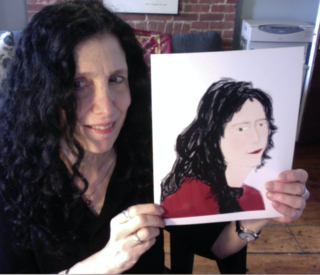Anxiety
Does Anxiety Impact Body Dysmorphia? Absolutely
Our mood often can impact how we see our bodies.
Posted June 23, 2021 Reviewed by Jessica Schrader
Key points
- By calming down our anxiety about how we look, we can improve our perceptions.
- Anxiety can distort body image.
- Our moods often impact how we perceive our bodies.

Here are the bodily facts about me: I am 5-foot-4. I weigh 119 pounds. I have a mop of long black curly hair. I’m pale as parchment. I had five major surgeries when I was critically ill, so my stomach is misshapen, and I have tons of scars on my torso.
Here is what I see and believe: I’m fat and I need to lose 10 pounds. My hair is a nightmare and people are staring at me and thinking oh my God, that woman needs a decent haircut and why is her hair black when she should be growing gray gracefully? I look like a vampire. I look like a fool. And the more I think about how I appear to others, the worse I appear to myself.
The more I think about all of this, the more anxious I get. The mirror isn’t helping me because to me, the mirror shows I do indeed look like a vampire, that not only is my hair terrible, but it looks like I don’t have any. Am I going bald? I worry. Am I gaining weight? The self-loathing moves me to the computer where I obsessively search for remedies, and sometimes, God help me, I will spend $40 or $50 to get them. (Psst: they never work, and they actually ramp up the anxiety, so everything gets worse.)
But is seeing really believing? And where did all of this come from, anyway?
Bet you can guess, and it rhymes with zamily.
My hair comes, of course, from family issues. My older sister has straight, glossy, gorgeous hair that everyone complimented constantly. Mine is a wild jungle. Everyone in my high school had straight hair, and though I did my best, even ironing it, I was known as “the frizz farm.” It wasn’t until after I had my son, and I was too exhausted to think about my own hair, that I left it alone. It sprang out into curls, and to my shock, people stopped me on the street to compliment it.
My weight? Ditto. I was so skinny growing up that I used to put weights in my pockets when we were weighed, in front of the class. I endured the mockery. Even at my father’s shiva, a relative remarked, pointing at me: She looks like a skeleton. There isn’t anything I can do, save a spray tan, to fix my ghostly skin, and I know that every summer, someone or six someones are sure to say, “You could use a tan!”
It's no wonder my anxiety about my looks comes from growing up in a family where looks were prized.
But the more I thought about it, the more I realized something that didn’t quite fit that story. The one part of me which really and truly is deformed, my stomach, I actually like now. I had five emergency surgeries after a coma (I wrote about it in my novel With or Without You), and since no one expected me to live, they cut muscle. When I got well, no doctor would operate to fix my stomach. No one wanted to risk the blood disorder coming back so they told me to live with what I have. What I have is a belly button on my far right. What I have is a triangle of a stomach.
But my stomach doesn’t bother me, and why not? Because Jeff, my husband, told me I was beautiful every day, even when it was clear that I wasn’t. Because his desire for me never let up. Because after some teenagers were snickering at me on the subway, he made me buy a fitted sundress. His love and devotion made me kinder to my own body. I was seeing myself through his eyes.
And there is something else. When I was sick, I was indeed disfigured by illness. I had indeed lost my hair and wore a kerchief around it. I was bloated out by the meds and steroids, and my skin, though no longer pale, was now gray.
And I had to go to Victoria’s Secret to get catalog-writing work because of our medical bills. I knew a woman there, Kate, and I had begged her to just messenger the work to me. “Don’t be silly!” she said. “I want to see you!” I explained to her that I looked very, very different. “Just come!” she said.
So I did. The only dress that fit me was a muumuu. The kerchief around my head looked so terrible that I tried to slick my hair back. I walked into the Victoria's Secret offices, and everyone was slim and stylist and knockout gorgeous, and when Kate came out, work in her hand, she stopped short and stared. Yep. She stared. And she came towards me and said how sorry she was, but the job had been canceled. But nice to see me.
I don’t know why, but walking out of that office, I felt empowered. I stood up straighter and walked past the women in their tight short skirts, their flawless hair, and I felt that I had somehow secret knowledge. Not only was I still me, but in my realization of what’s important and what isn’t, I felt that I had grown, that I was actually a better me, a more compassionate one. I stopped on the street and leaned against a building and took in deep, yoga breaths. I began showering my body with love because I was alive, alive, alive, and still on the earth. My scars and my oddly shaped stomach were my merit badges, not something to be shamed for.
Then I thought about all the people I loved, how what I loved wasn’t a shiny sheet of hair but a sense of humor. How a person became beautiful to me by their compassion, their wit, their joy for life. None of us has to listen to media messages (or messages from others!) about how we should be thinner, better, and conform to ridiculous standards of beauty.
Think of the people you love. Think of the people who love you. Think of what it is that is loved. Because when it comes to looks, seeing is not believing. Now, whenever anxiety hits and my body dysmorphia strikes, I take a deep breath. Because I know after I've calmed myself, my sense of self will calm down, too.




